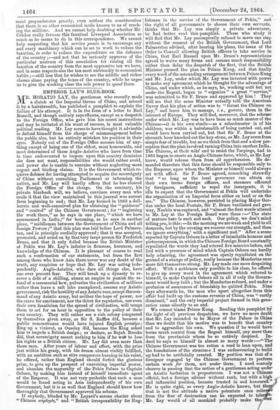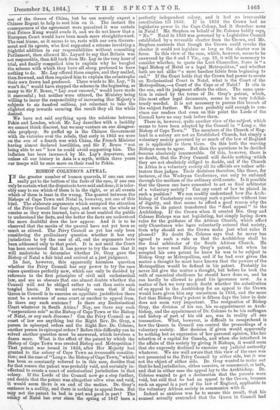EMPEROR LAY'S BLUE-BOOK.
MR. HORA.TIO LAY, the gentleman who recently made a clutch at the Imperial throne of China, and missed it by a hairsbreadth, has published a pamphlet to explain the failure of his attempt. It is in the form of a letter to Earl Russell, and though entirely superfluous, except as a despatch to the Foreign Office, who gave him his secret instructions and may be irritated at his want of success, is most valuable political reading. Mr. Lay seems to have thought it advisable to defend himself from the charge of mismanagement before the public also, but he entirely mistakes his position in their eyes. Nobody out of the Foreign Office accuses him of any- thing except of being one of the ablest, most honourable, and most determined of those Anglo-Asiatics who have from time to time endeavoured to impose upon this country dominion she does not want, responsibilities she would rather avoid, and power she is unable to exercise without neglecting more urgent and binding claims. It is the Government which re- quires defence for having attempted to acquire the sovereignty of China without consulting Parliament or informing the nation, and Mr. Lay will hardly affirm that he has cleared the Foreign Office of the charge. On the contrary, his private bluebook will, we believe, convince every man who reads it that the view maintained in this journal was correct from beginning to end ; that Mr. Lay formed in 1863 a deli- berate and well-conceived plan for obtaining the "guidance" and "control" of the Chinese Government ; for "beginning the work there," as he says in one place, "which we have commenced in India;" for becoming, as he says in another place, "middleman between the Government of China and all foreign Powers ;" that this plan was laid before Lord Palmers- ton, and in principle cordially approved ; that it was accepted, promoted, and acted on by thatvery inept person Sir Frederick Bruce, and that it only failed because the British Minister at Pekin was Mr. Lay's inferior in firmness, keenness, and knowledge of the Chinese. It is pleasant of course to read such a confirmation of our statements, but from the first among those who know Asia there never was any doubt of the truth, any suspicion or hope that Mr. Lay was acting inde- pendently. Anglo-Asiatics, who dare all things else, have one ever present fear. They will break up a dynasty to re- cover a debt of a shilling, annex an empire to punish the re- fusal of a ceremonial bow, pulverize the civilization of millions rather than leave a salt lake unexplored, assume any Asiatic government, risk the hostility of any Asiatic race, accept the com- mand of any Asiatic army, but neither the hope of power, nor the crave for emolument, nor the thirst for reputation, nor even their own fanaticism for the spread of civilization, will tempt them to act for an hour in opposition to the policy of their own country. They will rather see a rich colony conquered by themselves given away, as Sir S. Raffles did, because a public remonstrance would have injured English prestige; fling up a vizierat, as Ouseley did, because the King asked him to impede a British design ; or declare, as Rajah Brooke did, that sovereignty meant nothing to him if he waiv to lose his rights as a British citizen. Mr. Lay did even more than these men. After years of labour and effort, with the prize just within his grasp, with his dream almost visibly fulfilled, with an ambition such as stirs conquerors burning in his veins, he offered, rather than England should forfeit the glorious prize, to give up the prospect of exercising imperial power, and abandon the mayoralty of the Pekin Palace to Captain Osborn, by making him instead of himself immediate agent of the Emperor. It was not very probable that such a man would be found acting in Asia independently of his own Government, but it is as well that England should know how thoroughly that Government approved his scheme. If anybody, blinded by Mr. Layard's serene chatter about "Chinese employes," and "British irresponsibility for Eng- lishmen in the service of the Government of Pekin," and the right of all governments to choose their own servants, thinks that Mr. Lay was simply a private adventurer, he had better read this pamphlet. Those who study it will find that Mr. Lay peremptorily refused to move one step without the consent of the British Government, that Lord Palmerston advised, after hearing his plans, the issue of the Order in Council allowing British officers to take service in China, that Earl Russell upon Mr. Bruce's representations agreed to waive many forme and assume much responsibility rather than delay the despatch of the fleet, that the British Minister pressed the plan on Prince Kung, and that finally every word of the astounding arrangement between Prince Kung and Mr. Lay, under which Mr. Lay was invested with power to make any agreement which he thought for the advantage of China, and under which, as he says, he, working with but not under the Regent, began to " organize " a great "service," was submitted to Sir F. Bruce and approved by him ! They will see that the same Minister actually told the American Envoy that his plan of action was to "thrust the Chinese on Lay," and leave him to manage, i. e., govern, them in the interest of Europe. They will find, moreover, that the scheme- under which Mr. Lay was to have been as much master of the Chinese—it is his own simile—as a schoolmaster is of his children, was within a hairsbreadth of being carried oat, and would have been carried out, but that Sir F. Bruce at the eleventh hour knocked out the key-stone, as Mr. Lay avers from simple fear of trouble, but as we think from that and a slow per- ception that the plan involved turning China into another India. The Chinese, at their wits' end to resist the Taepings, had in 1863 begun to create an Anglo-Chinese force, which, as Mr. Lay knew, would release them from all apprehension. He de- manded therefore that this force should be responsible only to the Emperor, upon whom the Minister or himself could always act with effect. Sir F. Bruce agreed, remarking shrewdly that " so long as the local governors can obtain on their awn terms foreign officers, and steamers officered by foreigners, sufficient to repel the insurgents, it is idle to expect that the Government at Pekin will undertake the organization of an Imperial force either on land or on the sea." The Chinese, however, persisted in placing Major Gor- don under the local Foutais, Sir F. Bruce vacillated and gave way, Nankin was captured, and "almost the first words uttered to Mr. Lay at the Foreign Board were these The state of matters here is such and such. Our policy, we don't mind telling you, is this: —In the morning we are weak and yield to all demands, but by the evening we recover our strength, and then we ignore everything,' with a significant nod." After a scene reported by Captain Osborn in a letter of inimitable humour and picturesqueness, in which the Chinese Foreign Board constantly repudiated the words they had uttered five minutes before, and lied with a presence of mind which Captain Osborn can hardly help admiring, the agreement was openly repudiated on the ground of a change of policy, really because the Mandarins once more felt themselves strong. Mr. Lay made one more despairing effort. With a nobleness only possible to his class, he offered to give up every word in the agreement which referred to himself, to make Captain Osborn all in all if only the Govern- ment would keep faith ; but the Mandarins refused, and under a profusion of assurances of friendship he quitted Pekin. Nine days afterwards he, the man who apart altogether from this affair had built up the customs revenue of China, was "curtly dismissed," and the only imperial project framed in this gene- ration came silently to an end. Wo cannot blame Prince Kung. Reading this pamphlet by the light of all previous despatches, we have no more doubt that Mr. Lay intended to be Mayor of the Palace in Chins than we doubt that his motive was to benefit that country and to aggrandize his own. We question if he would have borne much control from the Regent himself, any more than from the provincials whom he so entirely despised. In- deed he says so himself in almost so many words :—" The Chinese Government was too rotten a reed to lean upon, and the foundations of the structut e I was endeavouring to build up had to be artificially created. My position was that of a foreigner engaged by the Chinese Government to perform certain work for them, not under them. I need scarcely observe in passing that the notion of a gentleman acting under an Asiatic barbarian is preposterous. I was not a Chinese official, but a foreign adviser without rank, but with a high and influential position, because trusted in and honoured." He is quite right, as every Anglo-Asiatic knows, but the that is not the attitude a native potentate once reli from the fear of destruction can be expected to tol Mr. Lay would of all mankind probably make the use of the throne of China, but he can scarcely expect a Chinese Regent to help to seat him on it. The instant the consequences of the agreement were perceived it was certain that Prince Kling would evade it, and we do not know th0 a European Court would have been much more straightforward. The real blame, as it seems to us, rests with our own Govern- ment and its agents, who first supported a scheme involving a frightful addition to our responsibilities without consulting Parliament, then allowed Mr. Layard to say that Britain was not responsible, then fell back from Mr. Lay in the very hour of trial, and finally compelled him to explain why he bungled the scheme with which they have all along professed to have nothing to do. Mr. Lay offered them empire, and they smiled, then frowned, and then required him to explain the catastrophe their own frown had produced. Three words to Mr. Lay, "It won't do," would have stopped the scheme in the beginning, as many to Sir F. Bruce, "Lay must succeed," would have made it successful ; but neither were uttered, the Ministry being willing to incur the responsibility of increasing Her Majesty's subjects to six hundred millions, yet reluctant to take the slightest step towards securing the result they all the while desired.
We have not said anything upon the relations between Pekin and London, which Mr. Lay describes with a lucidity we cannot think discreet, but we may venture on one disagree- able prophecy. So puffed up is the Chinese Government with its victories over the rebels, that early in 1863 we were on the eve of a fourth war with China, the French Minister having almost declared hostilities, and Sir F. Bruce "not being able to see" how he could avoid supporting him. The inflation has been increased by Mr. Lay's departure, and unless all our history in Asia is a myth, within three years our troops will be once more on their road to Pekin.































 Previous page
Previous page